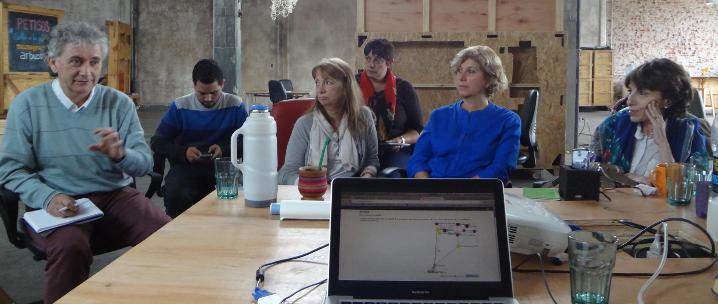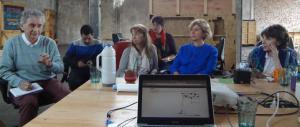Open Network Axiomatic
Nodo (Node) is a quasi-methodology or open network axiomatic that explores the conditions of a network’s reflection on itself and its potential synergies or futures. It also works as a tool that transforms the traditional blog post format into a machine that establishes and visualizes relationships between entries, categories and posts, through to describe and interact in complex scenarios with heterogeneous actors. It has its origins in the OfCon (Office of Connectivity) platform, developed by m7red and Leonardo Solaas, with the support of Het Blauwe Huis, Netherlands.
The OfCon project was an assembly tool built during m7red’s stay in Het Blauwe Huis: Housing Association for the Brain. OfCon was codesigned by Leonardo Solaas, net artist, and Florencia Alvarez, assistant editor, between 2006 and 2007. Its development was funded by Het Blauwe Huis and presented at Socially Yours, alternative network design seminar, organized by The Community Museum Project, in the Polytechnic University of Hong Kong. One of its applications was in the project “Assembly: Matanza-Riachuelo river basin actor mapping 2009”.
In 2013 the Nodo methodology was adapted for a project designed for the Argentine chapter of Ashoka, a global organization that promotes entrepreneurial culture and social innovation, for the mapping of an experimental collective cartography regarding the topic of disability. The problem that was first posited from Ashoka for the construction of this cartography was: Is it possible to explore the ways or connections that horizontally interject with entrepreneurs? What would emerge from this exploration? Is it possible to make this hypothetical grouping strengthen its relationships?
The focus started from an ethnographic exploration with sights put on gathering a base material to understand the relationship’s potentialities. As it became clear that the potentials for connection between entrepreneurs were many, many possibilities for the interpretations of practices, scenarios, achievements and capacities arose. This is how the project shifted from product generation, a cartography, to an emergent cartographic process. This is a process where each actor feeds iteratively the connection map, where the territory to be mapped participates in the process of mapping. When we say “process”, this refers to a back and forth cycle where the resulting information is an input that enters the cycle again. In this case, the technological recursivity only supported the reflexivity of conversations between actors. The tool designed for Ashoka was named Congrega 1.0 and was presented in Ashoka’s chapter in Argentina.
Nodo is a GNU licensed common good, openly available in GitHub, and is used in the m7red website.
Credits:
OfCon
- Development: Leonardo Solaas.
- Editor: Florencia Alvarez
- Support and funding: Het Blauwe Huis, Housing Association For the Brain, Amsterdam, Netherlands, 2006-2007.
- Presented at Socially Yours, alternative networking design seminar, organized by the Hong Kong Polytechnic University, Hong Kong, 2007.
Nodo
- Development: Andreas Hempfling.
- Collective cartography tool brainstorming: cheLA, Buenos Aires, Argentina, 2014.
- Concept and development for Ashoka: m7red in collaboration with GarageLab. Entrepreneurs: Beatriz Pellizari (La Usina, RedActivos), Raul Lucero (Andar), Silvana Veinberg (Asociación Civil Canales), Victoria Schocron (Fundación Discar), Pilar Ferro (CARE).
- Presentation of the Congrega 1.0 tool in Ashoka’s Argentine chapter, Buenos Aires, Argentina, 2014.


